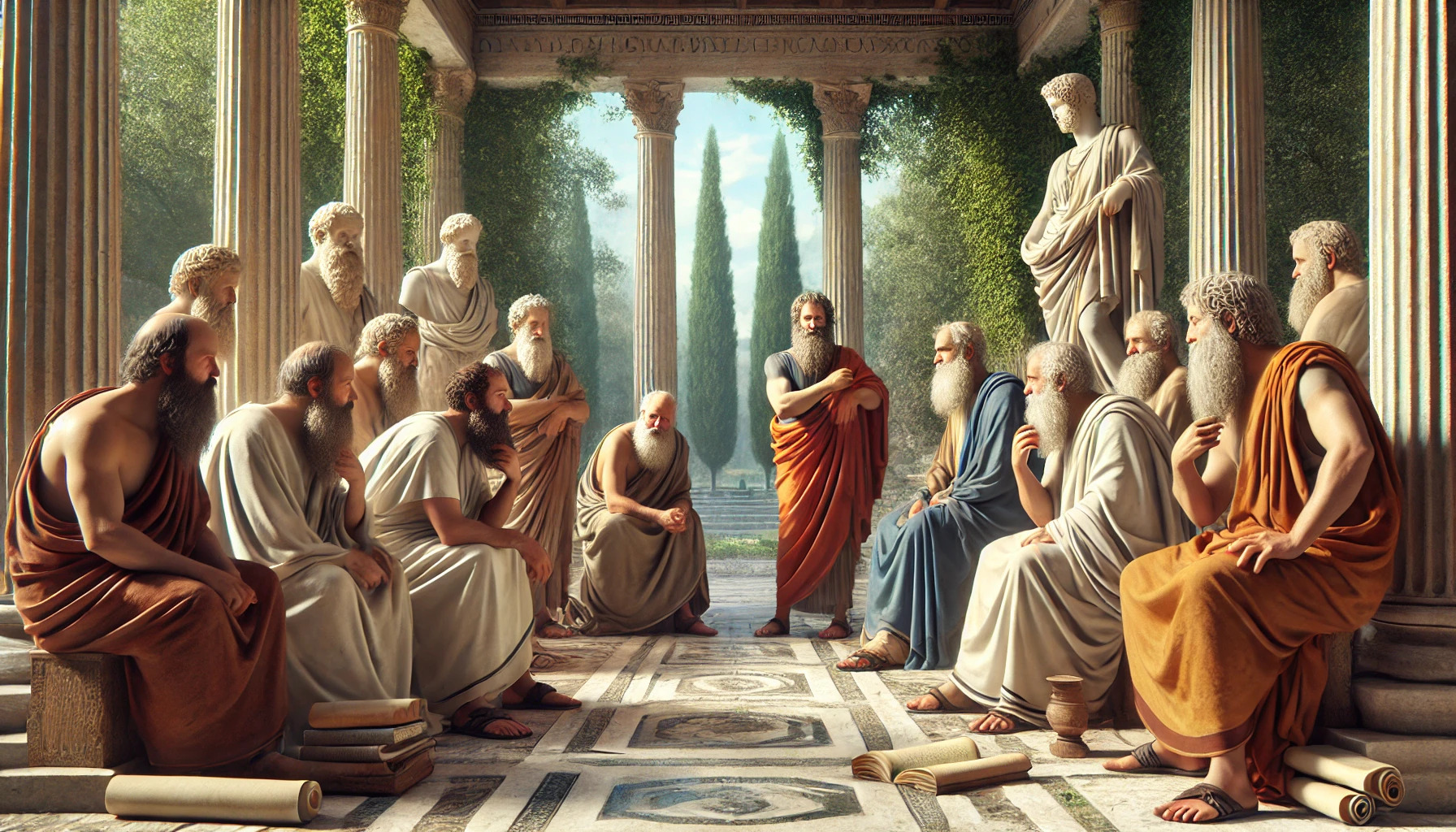In ancient Rome, beards carried significant meaning and were often used to express philosophical beliefs. The styles of facial hair adopted by philosophers signified their dedication to various schools of thought. These beards were more than cosmetic choices; they served as powerful symbols of philosophical identity and allegiance.
Throughout history, these iconic beards have sparked curiosity about their role in shaping the identities of notable thinkers. For example, different styles indicated which philosophical tradition they practiced, allowing for a clear visual distinction among schools of thought. This interesting relationship between facial hair and philosophy highlights how appearance can reflect deeper values and beliefs.
Exploring the connection between beards and philosophy reveals much about the social dynamics of ancient Rome. These philosophers used their beards as statements of identity, creating a bond between their outward appearance and inner convictions. Readers will find that the beards of Roman philosophers tell a fascinating story of values, culture, and the quest for intellectual truth.
Philosophical Allegiances in Ancient Rome
In ancient Rome, philosophy was a significant part of everyday life. Philosophers expressed their beliefs not just through words, but also through their appearances.
Beard styles became a way to show allegiance to different schools of thought. For instance, Stoics often had more rugged beards, symbolizing their focus on virtue and self-control. In contrast, followers of Epicurus favored neater styles, reflecting their teachings about pleasure.
Philosophers like Seneca and Epictetus were well-known figures. They used their beards as a symbol of wisdom. Long beards were seen as a status sign, linking them to ideals of masculinity and thoughtfulness.
Some philosophical schools even had their unique beard trends. For example:
- Stoicism: Long and unkempt
- Epicureanism: Trimmed and tidy
- Skepticism: Varied, reflecting individual choice
These styles helped others identify a philosopher’s beliefs quickly. It was an important part of their identity and message.
The way a philosopher wore their beard spoke volumes. It communicated their thoughts on life and society, showing how deeply intertwined philosophy and personal presentation were in that era.
The Beard as a Symbol
The beard served as a strong symbol for Roman philosophers. It reflected their identity, values, and philosophical beliefs. Different styles and traditions around beards became notable aspects of their culture.
Origins and Meanings
In ancient times, the beard was associated with wisdom and maturity. Greek thinkers like Socrates and Plato wore beards that signified their philosophical status. As shaving grew more popular, philosophers adopted beards as a symbol to distinguish themselves from ordinary citizens.
This shift marked the beard as a representation of ethical living and intelligence. It became a marker of philosophical allegiance, helping to create a sense of unity among followers of various schools of thought. The longer the beard, the more it represented dedication to philosophy.
Beard Styles and Variations
Roman philosophers displayed a range of beard styles, each carrying specific meanings. For example, the full beard was often seen as a sign of wisdom and respect. In contrast, a trimmed beard represented a more practical approach to life and thought.
Beard styles helped philosophers identify which philosophical school they belonged to. Some styles, like the “goatee,” became popular among followers of particular sects. This diversity highlighted personal beliefs and attitudes within the broader philosophical community.
The Beard in Roman Culture
In Roman society, the beard represented moral integrity and philosophical dedication. Figures like Marcus Aurelius emphasized that a well-kept beard demonstrated a commitment to ethics.
The beard also challenged societal norms. Philosophers rejected the prevailing trends of clean-shaven faces to embrace this symbol of thought and reflection. This choice was more than fashion; it served as a powerful statement of individuality and purpose in a culture that often valued appearance over substance.
Through these various aspects, beards became central to understanding the identity and beliefs of Roman philosophers.
Notable Bearded Philosophers
Bearded philosophers were significant figures in ancient Rome, each embodying their school’s ideals and ways of thinking. Here are three notable philosophers who sported beards and left a lasting impact.
Marcus Aurelius
Marcus Aurelius was a Roman emperor and a prominent stoic philosopher. He is best known for his work “Meditations,” where he reflected on personal ethics and leadership. His beard was a symbol of his philosophical commitment and authority.
He believed in living in harmony with nature and practicing self-control. Marcus emphasized the importance of rationality and virtue in daily life. His teachings encourage individuals to remain resilient amid challenges, highlighting the stoic belief in accepting the things one cannot change.
Marcus Aurelius’s life and philosophy continue to inspire people to pursue inner peace and moral integrity.
Epictetus
Epictetus was a former slave who became a highly respected stoic philosopher. He taught that philosophy is not just theory but a way of life. His beard represented his wisdom and his commitment to living a virtuous life.
He emphasized that individuals should focus on what they can control, like their thoughts and actions. Epictetus also believed that emotions should be managed through reason. His ideas have encouraged many to cultivate personal freedom and resilience.
His teachings remain relevant today, motivating individuals to adopt a stoic approach to life’s challenges.
Lucius Annaeus Seneca
Seneca was not only a philosopher but also a playwright and advisor to Emperor Nero. His beard symbolized his philosophical beliefs and status in
Influence of Philosophy on Facial Hair
Facial hair among Roman philosophers wasn’t just about grooming; it reflected their philosophical beliefs. Different schools of thought influenced how philosophers wore their beards. Each philosophy communicated specific values and ideas through their choice of facial hair.
Stoicism and Its Impact
Stoicism emphasized control and virtue, and this extended to personal appearance. Stoic philosophers, like Epictetus, wore their beards as a symbol of their commitment to these ideals. The longer and more rugged beard represented strength and wisdom.
For Stoics, shaving was often seen as an act of vanity, which contradicted their teachings. A full beard became a badge of honor, indicating a life of discipline and inner peace. This connection to their philosophical ideals helped solidify the beard’s importance within this school of thought.
Epicureanism and Appearance
Epicureanism focused on seeking pleasure and tranquility in life, influencing their views on appearance. While Epicureans didn’t shun beards, they preferred a more refined and clean look. They believed grooming could contribute to a pleasurable life.
A well-kept beard indicated that a philosopher paid attention to personal care without being overly vain. This balance showed their pursuit of moderate pleasure and appreciation for aesthetics. The Epicureans showcased that while appearance mattered, it should not overpower one’s philosophical journey.
Cynicism and Rejection of Norms
Cynics, on the other hand, took a very different approach to facial hair. They often rejected societal norms, including grooming standards. Philosophers like Diogenes famously sported unkempt, wild beards to symbolize their disdain for materialism and societal expectations.
For them, a shaggy beard represented freedom from the constraints of society. This deliberate choice was a way to challenge others and provoke thought about what truly mattered. By neglecting their appearance, they highlighted the importance of living in accordance with nature and personal truth. Each style served as a commentary on their beliefs, making facial hair a powerful emblem of their philosophy.
Beards Across Other Philosophical Schools
Philosophers from various schools had distinct views on appearance, especially concerning facial hair. Beards often reflected their beliefs and affiliations, providing insight into their philosophical identities.
Platonism and the Academy
In Platonism, the beard symbolized wisdom and a connection to the divine. Plato himself did not emphasize facial hair heavily, but his followers believed that a well-groomed beard could signify the pursuit of truth.
Plato’s Academy attracted students who often adopted the look of their teacher. Their beards were emblematic of their commitment to philosophical inquiry. This style communicated seriousness, aligning with Plato’s ideas about the ideal forms and the quest for knowledge.
Aristotelianism and Its Approach
Aristotelians had a more pragmatic view of beards. For them, facial hair represented not just wisdom but also a natural aspect of being human. Aristotle taught that individuals should embrace their natural state, which included physical features like beards.
Students in Aristotle’s school often wore their beards in a straightforward manner. This confirmed their affiliation with a philosophy that focused on nature and virtue. The beard was less about style and more about authenticity and personal character.
Skepticism and Expression
The Skeptic philosophers had a unique take on beards. They often questioned the norms and beliefs of the society around them, including the significance of physical appearance. For Skeptics, a beard was a way to express their divergence from mainstream thought.
The style and grooming of beards among Skeptics varied greatly. Some may have worn their beards unkempt to signify their rejection of conventional ideas. Their beards became a symbol of their critical approach to truth and knowledge, reflecting their core beliefs.
Decline of the Philosopher’s Beard
The decline of the philosopher’s beard reflects significant changes in society, culture, and beliefs during Roman times. Several factors contributed to this shift, marking a departure from the traditional image of philosophers proudly displaying their facial hair.
Sociopolitical Changes
As the Roman Empire expanded, sociopolitical dynamics shifted dramatically. Philosophical schools competed for influence and status within the Empire. During this time, a beard could symbolize allegiance to a specific school or set of beliefs. However, as the Empire grew, the pragmatic focus on governance and power overshadowed these traditional symbols. The image of a philosopher began to be redefined according to the changing power structures.
Rise of the Shaven Ideal
Alongside political changes, there was a notable fashion shift. By the late Roman Republic and early Empire, a preference for a clean-shaven look emerged among the elite. Influential figures, such as Emperor Augustus, set trends that favored smooth faces. This ideal represented cleanliness, refinement, and youthfulness. The rise of this fashion led many philosophers to adopt a shaven appearance, distancing themselves from the traditional image of the bearded sage.
Religious Influences
Religious customs also played a significant role in the decline of the philosopher’s beard. As Christianity spread throughout the Roman Empire, its values began to influence societal norms. Early Christians often wore beards, but the focus shifted gradually towards a more refined appearance. Philosophers began to align themselves with these emerging beliefs, leading to a generalized acceptance of the shaven look. This shift impacted how philosophical authority was expressed, moving further from the bearded ideal and adapting to the prevailing religious culture.
Impact on Modern Perceptions of Wisdom
Beards have long been associated with wisdom in various cultures. In ancient Rome, philosophers wore beards as symbols of their intellectual pursuits. Today, many still see facial hair as a sign of maturity and knowledge.
In modern settings, figures like professors or leaders often sport beards. This can create an impression of authority and intelligence. For example, many famous thinkers, from Socrates to modern scientists, are depicted with beards.
Cultural influences also play a role. In some communities, having a beard is linked to wisdom and respect. This adds to the perception that bearded individuals possess deeper insights.
Interestingly, the styles of beards can communicate different meanings. A long, unkempt beard may suggest a free spirit, while a neatly trimmed beard might indicate professionalism.
Beards are more than a fashion statement. They shape how society views wisdom, allowing people to associate facial hair with thoughtful reflection and depth of character.

